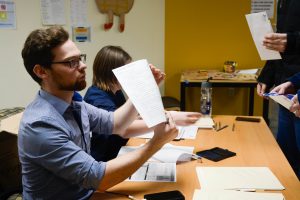USU students simulate the international student experience
Sydney Thomas breathes a long sigh after watching her undergraduate application torn to shreds. She has already filled it out twice before, but cannot understand what she is missing, as the short-tempered worker poised behind the desk is not speaking in a language Thomas understands.
Lucky for Thomas, she doesn’t really need a visa. She’s lived in the United States her entire life. She came to Utah State University from Seattle after filling out a short online application and paying the $50 fee. As for the worker who tore the application apart — he knows exactly what a headache this process is.
“Now you know what I went through,” said George Eck, an international student at Utah State.

International students came to help with the LLC’s hosted event, Acirema, on Nov. 28. The event was made in order to simulate the hardships and difficulties that international students go through in order to become accepted and students of USU.
Eck and the rest of the residents of the on-campus Global Village, the on-campus housing where most international students live, staffed the booths at the Living Learning Community as a part of the diversity-focused event, Acirema — America spelled backward. Attendees were given some identifying information and had to complete all the steps of applying as an international student to Utah State. They had no guidance and could be turned away at booths for any reason.
“We want students to empathize with the international student experience,” said Lianna Hill, the graduate residence director for the LLC. The event was organized by Hill and Naomi Ward, an LLC resident assistant, based on an example from Kent State University.
By randomizing the booths’ locations and causing chaos, Hill said, the event more accurately simulated the real experience; and by using international students to staff the booths, they can use their own experience to influence how they treat attendees.
“The international students are the bureaucratic roadblock,” said Amanda Castillo, the academic and immigration advisor for the Office of Global Engagement. “This serves to create empathy.”
After successfully — or not — simulating registration at Utah State, attendees were given French beignets and chips and salsa while a panel of international students discussed microaggressions.
“Just don’t assume anything,” said Paulina Rivera-Soto, a member of USU’s Latinx Student Union.
She said the most common microaggression she experiences is when people ask about her immigration status or if her parents speak English.
Every resident assistant must plan a diversity-themed event for their residents, Hill said, and she hopes the idea of Acirema can be used and improved upon for future events.
Sydney Thomas’ paperwork was eventually approved, even though she had to accept advice in English.
—carter.moore@aggiemail.usu.edu
@carterthegrreat


Let’s face it, being an international student away from home is difficult, compounded by our complex culture and language problems. Welcoming and assimilation assistance must come from numerous sources, including the White House, to aid these young people embarking on life’s journey. Most struggle in their efforts and need guidance from schools’ international departments, immigration protection, host families, concerned neighbors and fellow students, and even informative books to extend a cultural helping hand.
Something that might help anyone coming to the US is the award-winning worldwide book/ebook by ex-Utahn “What Foreigners Need To Know About America From A To Z: How to Understand Crazy American Culture, People, Government, Business, Language and More.” Used in foreign Fulbright student programs and endorsed worldwide by ambassadors, educators, and editors, it identifies how “foreigners” have become successful in the US, including students.
It explains how to cope with a confusing new culture and friendship process, and daunting classroom differences. It explains how US businesses operate and how to get a job (which differs from most countries), a must for those who want to work with/for an American firm here or overseas.
It also identifies the most common English grammar and speech problems foreigners have and tips for easily overcoming them, the number one stumbling block they say they have to succeeding here.
Good luck to all at USU or wherever you study or wherever you come from, because that is the TRUE spirit of the American PEOPLE, not a few in government who shout the loudest! Supporters of int’l students must shout louder.